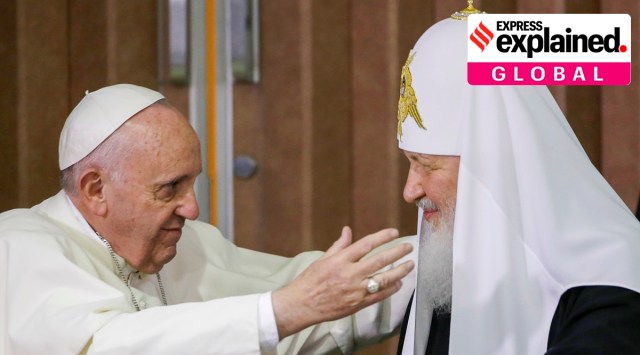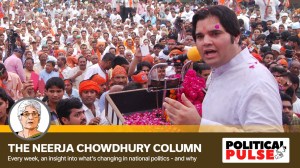- India
- International
Explained: Who is Patriarch Kirill, the religious leader facing threat of sanctions from the EU
Kirill, according to a Reuters report, has been added to a draft blacklist that includes hundreds of individuals with ties to the Kremlin, whom the European Union accuses of supporting Russia’s invasion of Ukraine.
 Pope Francis, left, reaches to embrace Russian Orthodox Patriarch Kirill after signing a joint declaration at the Jose Marti International airport in Havana, Cuba. (AP, file)
Pope Francis, left, reaches to embrace Russian Orthodox Patriarch Kirill after signing a joint declaration at the Jose Marti International airport in Havana, Cuba. (AP, file)The European Commission, the executive wing of the European Union, has reportedly proposed sanctions against Patriarch Kirill, the head of the Russian Orthodox Church and a close ally of President Vladimir Putin.
Kirill, according to a Reuters report, has been added to a draft blacklist that includes hundreds of individuals with ties to the Kremlin, whom the European Union accuses of supporting Russia’s invasion of Ukraine.
Buy Now | Our best subscription plan now has a special price
The proposed sanctions, which include the freezing of Kirill’s assets and a travel ban, would require the backing of EU states to be adopted.
Viktor Orban, the Hungarian Prime Minister with close ties to Putin, has stated in response that Hungary would not support the sanctions against Kirill because this was an “issue of religious freedom”.

Patriarch Kirill’s support for the war in Ukraine has also caused a rift with the Vatican. The Russian Orthodox Church on May 4, had admonished Pope Francis after he warned Kirill not to become Putin’s “alter boy”.
The Russian Orthodox Church
The Russian Orthdox Church (ROC), also known as the Moscow Patriarchate, is the largest of more than a dozen autocephalous (self-governing) Eastern Orthodox Christian churches, with an estimated 100 million members.
Patriarch Kirill is the leader of the Moscow-based church that asserts exclusive canonical jurisdiction over all Eastern Orthodox Christians that live in the erstwhile republics of the Soviet Union, apart from Georgia, and more recently Ukraine. In January 2019, the newly established Orthodox Church of Ukraine was granted independence by the spiritual head of Orthodox Christians worldwide, signaling a historic break from the Russian Orthodox Church.
The ROC traces its roots to the time of Kievan Rus, a kingdom in Northern and Eastern Europe that existed from the late 9th to early 13th century. While an organised Christian community had already existed here by the mid 10th century, Vladimir I (the ruler of Kievan Rus) is credited to have propagated the religion widely. In 988 BCE, he converted to Christianity and established it as the state religion.
The Orthodox church in Russia was at that time, subordinate to the Ecumenical Patriarchate of Constantinople (Istanbul today), the religious leader of Orthodox Christrians across the world. The Russian Metropolitan (head of church) residence was first in Kiev, one of the most important cities in that region. However, the city began to witness a steady decline after the Mongol invasion in 1237 and by the 14th century, the Metropolitan seat was shifted to Moscow.
In 1448, the Russian Church began to assert its independence when the Russian bishops in Moscow elected their own head of the church, Jonas, without the consent of Constantinople. After the fall of Constantinople at the hands of the Ottomans in 1453, the ROC’s authority grew further and it was formally established as an autocephalous branch of Eastern Christianity. By 1589, the metropolitan of Moscow received the title of Patriarch, the highest rank within the Orthodox Church.
Patriarch Kirill’s support of the war
The head of the Roman Orthodox Church since 2009, Patriarch Kirill has through his statements seemed to have supported Russia’s invasion of Ukraine and in process proving it with religious undertones. Kirill has also been a longtime ally of President Vladimir Putin and called his long tenure “a miracle of God”.
While delivering a sermon in Moscow on April 10, he stated, “May the Lord help us all in this difficult time for our Fatherland to unite, including around the authorities, so as to repel external and internal enemies” of Russia.
Commentators state that Kirill has sought to portray the war in Ukraine as a kind of spiritual battle. While Putin has tried to justify his “special military operation” by claiming to “denazify” Ukraine, Kirill has reprimanded the Western world for forcing gay pride marches onto the people of the Donbas region. While referring to these supposed developments in a sermon in early March, Kirill said, “We’re talking about human salvation.”
The Patriarch has also frequently bestowed his blessings onto the Russian armed forces, giving the symbol of the Virgin Mary to a senior commander.
He even participated in the Victory Day celebrations on May 9, Russia’s annual celebration of the Soviet Union’s defeat of Nazi Germany in World War II. During a wreath-laying ceremony he announced, “We must all work to ensure that our Fatherland becomes strong and invincible.”
Divisions within the orthodoxy
Kirill’s support for the Russian invasion has elicited condemnation from the Vatican, and also from the Orthdox communities at large. For the Ukranians that continue to consider Patriarch Kirill as their spiritual leader, his justification of the war has been a difficult pill to swallow.
While Orthodox worshippers in Ukraine, who continue to follow the Russian church despite the split, traditionally pray for the patriarch at all church services, a report by The New York Times states that 22 of the 45 such dioceses in Ukraine no longer mention Patriarch Kirill during prayers.
Father Pluzhnik, who fled from his home during the invasion and is now living in the town of Chernivtsi, in Western Ukraine, told BBC that he was “shocked” by the actions of the Russian church. He said that he had now left the ROC and had applied to join the Ukrainian Orthodox Church.
Clearly, Kirill’s actions have increased the pre-existing fissures within the orthodoxy.
Newsletter | Click to get the day’s best explainers in your inbox
Why the threat is significant
If imposed, sanctions against a religious leader with more than a 100 million followers would be significant. The only other figure to receive such treatment by Western powers in the recent past was Ayatollah Ali Khamenei, Iran’s supreme leader. After Iranian forces shot down a US drone in June 2019, President Donald Trump imposed sanctions on the Iranian leader, banning his travel to the US.
As per The New York Times, the threat of sanctions also has the potential to shift the balance of power between the increasingly splintered Orthodox Church.
EXPRESS OPINION
Apr 24: Latest News
- 01
- 02
- 03
- 04
- 05









































